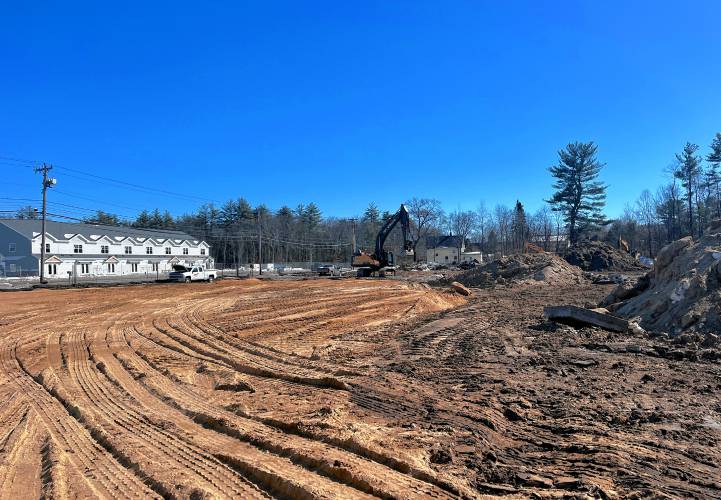‘Open up some doors’: Concord urged to make itself more attractive to developers

Construction begins on Fisherville Road on a project that initially proposed more housing but was rejected by the city of Concord. The developer was forced to build less than half of the units in the original design that was crafted using the city’s proposed zoning changes called Concord NEXT, which has since been shelved. Catherine McLaughlin
| Published: 03-28-2025 3:47 PM |
After a push to reimagine the way the city regulates development was quietly abandoned, the City of Concord will pursue changes to some zoning rules in the coming months to the relief of local business leaders.
“This is really good news,” Greater Concord Chamber of Commerce President Tim Sink said Wednesday. “This is one way to make the development process in Concord move more smoothly and open up some doors that are currently hard to open up.”
Developers in the area have historically lamented that Concord is a hard place to get things done, with an arduous approvals process playing a significant role, Sink told the city’s Economic Development Advisory Committee on Tuesday.
The city has made progress on that front in the last thirty years, he said, emphasizing that he sees the current city staff as talented and collaborative.
But some frustration remains: Delays to get approval drive up costs, and the text of the zoning ordinance itself creates more hoops for projects to jump through for a green light than in peer towns and cities.
“Some of these things just don’t go away,” Sink said in an interview.
“There are developers that will, if they have a bad experience in a community, they may not want to continue working in that community. They have other choices,” he said. “Some of Concord’s competitors are pretty aggressive in terms of laying out the red carpet and attracting businesses. So we have to be in that same boat.”
Based on conversations with local leaders, developers, construction experts and zoning board members, the Concord Chamber developed a list of areas ripe for short-term change. Parking requirements were at the top, followed by relaxing requirements for accessory dwelling units, setback requirements, grandfathering, signage and home businesses.
Article continues after...
Yesterday's Most Read Articles
 Skeletal remains across from state prison identified as Concord fugitive
Skeletal remains across from state prison identified as Concord fugitive
 Man dies in RV fire in parking lot of Concord’s Steeplegate Mall
Man dies in RV fire in parking lot of Concord’s Steeplegate Mall
 25-year-old Concord man identified as Steeplegate Mall RV fire victim
25-year-old Concord man identified as Steeplegate Mall RV fire victim
 ‘Field of Dreams’ to ‘a dump’ – What golfers have to say about Concord’s plans to rebuild the Beaver Meadow clubhouse
‘Field of Dreams’ to ‘a dump’ – What golfers have to say about Concord’s plans to rebuild the Beaver Meadow clubhouse
 ‘New Hampshire is just going to embarrass itself’: Former Child Advocate warns against proposed office cuts
‘New Hampshire is just going to embarrass itself’: Former Child Advocate warns against proposed office cuts
 N.H. mulls immigration bill to ban sanctuary policies and overrule local control
N.H. mulls immigration bill to ban sanctuary policies and overrule local control
Working in batches, city staff will begin bringing the first round of changes to city committees for review next month, which largely overlap with the Chamber’s suggestions, but not exactly.
These are targeted fixes on an interim basis. More comprehensive planning and zoning reform won’t come until after the city updates its master plan, an initiative penciled in for the next few years, according to officials.
With the urging of business and development leaders and voices within city government, the current effort is a recognition that some changes can’t wait that long. Other parts are “housekeeping” to bring the city’s rules in line with state law.
“There are several areas where I think we could stand some improvement and I would rather not have to wait until a whole new master plan came out,” said longtime Zoning Board Chairman Chris Carley, who gave input for the Chamber’s list.
Because city rules are strict on things like parking and signage and because the setback rules don’t take into account smaller lot sizes in certain parts of the city, it means the board gets, and grants, more requests for exceptions than would be necessary with an updated ordinance.
“I would hope there’d be situations where the board is frequently asked to grant variances and does so that they wouldn’t have to come to us at all," said Carley, who expressed his own opinions rather than those of the zoning board. “Otherwise, why are we spending their money and taking their time to do that?”
The planning board will seek public input as it weighs the changes and make recommendations before the language goes before City Council.
Because they are still being drafted, the amendments are not yet available to the public.
The first batch, per an outline from Matt Walsh, the deputy city manager for development, includes several of those highlighted by the Chamber, though parking is not at the front of the line. That’s something Chamber board members Ari Pollack – an attorney who routinely represents developers before the planning board – and former mayor Jim Bouley, who both serve on the economic development committee, want to see fast-tracked.
Concord has long recognized that its zoning rules needed updating. Its most recent effort to overhaul them, the Concord Next initiative, was abruptly halted after multiple public meetings and a prominent place on the city’s website.
The content of Concord Next, a form-based zoning plan, wasn’t universally smiled upon — but it was something.
Some developers initiated projects based on what seemed to be coming down the line, only for their plans to later be measured and fail, against the longstanding rules still in place.
For example, a Fisherville Road condo complex that recently broke ground was originally pitched as a multi-building, mixed-use complex with a mix of townhomes and more than 200 apartments, considered a “sample site” for Concord Next’s vision. But it was rejected based on the current rules. After multiple attempts at downsizing and roughly a year of delay, the current 83-unit condo proposal received city approvals.
Density doesn’t appear to be on the menu for interim amendments — it’s too expansive to be evaluated before the master plan is opened up. But the timeline shows how delayed zoning updates can trip up development.
“We would think that we’re on the verge of having something be put into place and then it just would stall and nothing would happen,” Sink said. “That process just kind of went on a long time, was probably pretty costly and didn’t result in anything positive.”
He’s optimistic about these interim updates.
“These aren’t rocket-science changes. They’re based on common sense,” Sink said. “You start removing some of those obstacles and it’ll have some impact on housing stock here.”
According to Walsh, the first round of amendments will be ready in about a month. They’ll have several stages of review before they can be voted on and implemented.
After Walsh described the changes staff are working on the Economic Development Committee members erupted in applause. Bouley, the former longtime mayor, cut them off.
“No clapping,” he said. “Nothing’s happened.”
Catherine McLaughlin can be reached at cmclaughlin@cmonitor.com.







 Photos: Signs of spring
Photos: Signs of spring Concord streets to close for Rock’N Race
Concord streets to close for Rock’N Race
